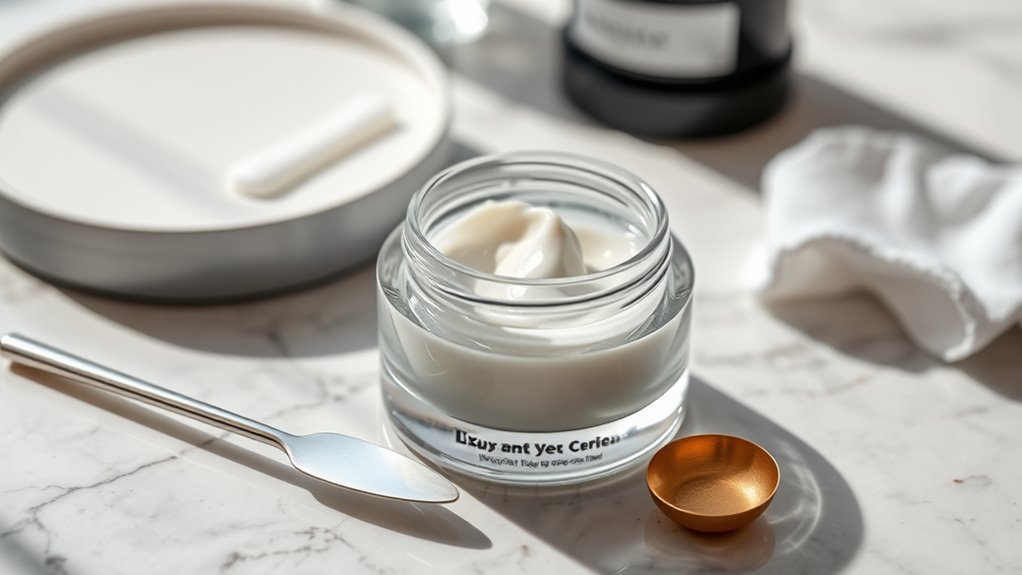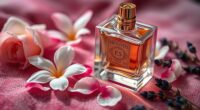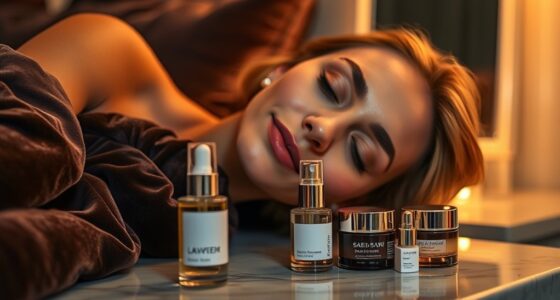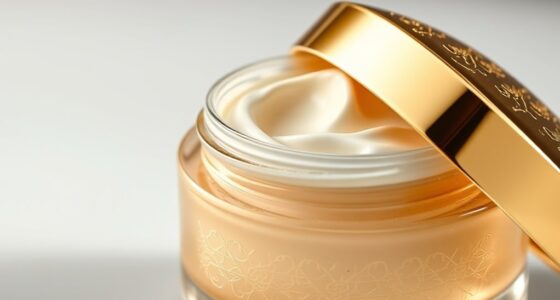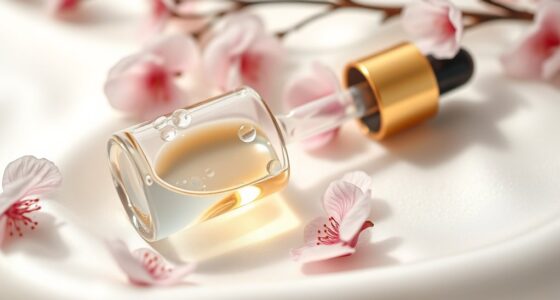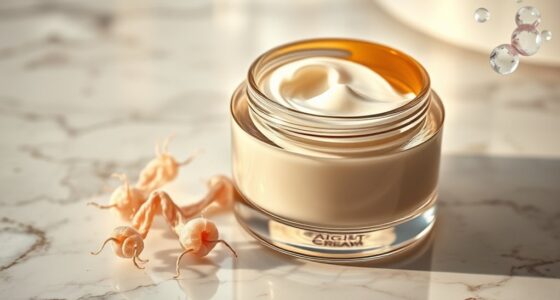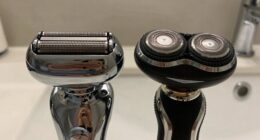You don’t necessarily need a luxury eye cream to see results; many affordable options contain effective ingredients like retinol, caffeine, and hyaluronic acid that tackle puffiness, dark circles, and fine lines. Eye creams are formulated for delicate skin with lighter textures and targeted actives, but regular moisturizers can work if they’re gentle and contain key ingredients. Want to discover how to choose the best product and get the most from your routine? Keep exploring for essential tips.
Key Takeaways
- Effective eye care depends on active ingredients like retinol and hyaluronic acid, not necessarily on luxury branding or price.
- Regular moisturizers can work for the eye area if formulated gently and containing targeted actives.
- Eye creams are designed for delicate skin, offering lighter textures and specific ingredients for concerns like puffiness and dark circles.
- High-cost luxury creams often focus on packaging and branding rather than proven superior efficacy.
- Consistent application and a good skincare routine are more important than choosing a luxury or drugstore eye cream.
What Makes Eye Creams Different From Regular Moisturizers?

Eye creams differ from regular moisturizers mainly because they’re formulated with lighter textures and fewer heavy oils. This helps prevent irritation and runoff into the eyes, which is vital for the delicate skin around the eye area. These creams contain targeted active ingredients like retinol, caffeine, and vitamin C, specifically designed to address common skin concerns such as puffiness and dark circles. Unlike regular moisturizers, eye creams are often fragrance-free and hypoallergenic, making them gentler and less likely to cause irritation. Their gentle formulation ensures they’re suitable for sensitive skin, helping to prevent irritation while effectively targeting issues like fine lines and discoloration. Additionally, eye creams are often designed to be both effective and safe for the delicate skin around your eyes, sometimes incorporating specialized formulations to enhance their efficacy. These formulations may also include hydrating ingredients to maintain moisture and improve skin resilience in the eye area, which is especially important given the delicate nature of eye skin. Incorporating ingredients that promote skin barrier repair can further improve their protective qualities. In fact, many eye creams are also formulated to address environmental stressors, helping to shield the skin from external damage.
Are Luxury Formulations Necessary or Just a Luxury?
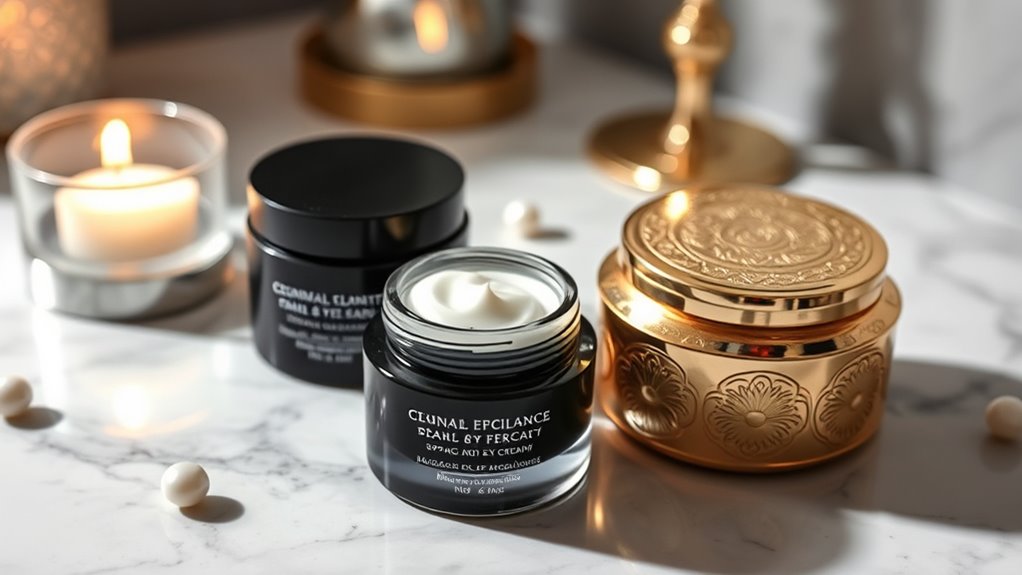
While luxury eye creams often come with high price tags, their added cost doesn’t always mean better results. Many contain active ingredients like retinol, vitamin C, and peptides at similar concentrations to drugstore formulations. The main differences usually lie in packaging, branding, and texture, not proven efficacy. Scientific studies show that effective anti-aging benefits can be achieved with affordable skincare that focuses on key ingredients. If your goal is to incorporate proven actives into your routine, a well-chosen drugstore product can match luxury creams in results. Here’s a comparison:
| Luxury Eye Creams | Drugstore Formulations |
|---|---|
| Premium packaging | Focus on ingredients |
| Brand reputation | Cost vs results |
| Sensory experience | Proven efficacy |
Additionally, formulation quality plays a crucial role in determining the effectiveness of an eye cream, regardless of its price point. For example, active ingredient concentration is essential for delivering visible results, and many budget-friendly products contain comparable levels of active compounds to their luxury counterparts.
Key Ingredients to Look for in Effective Eye Products
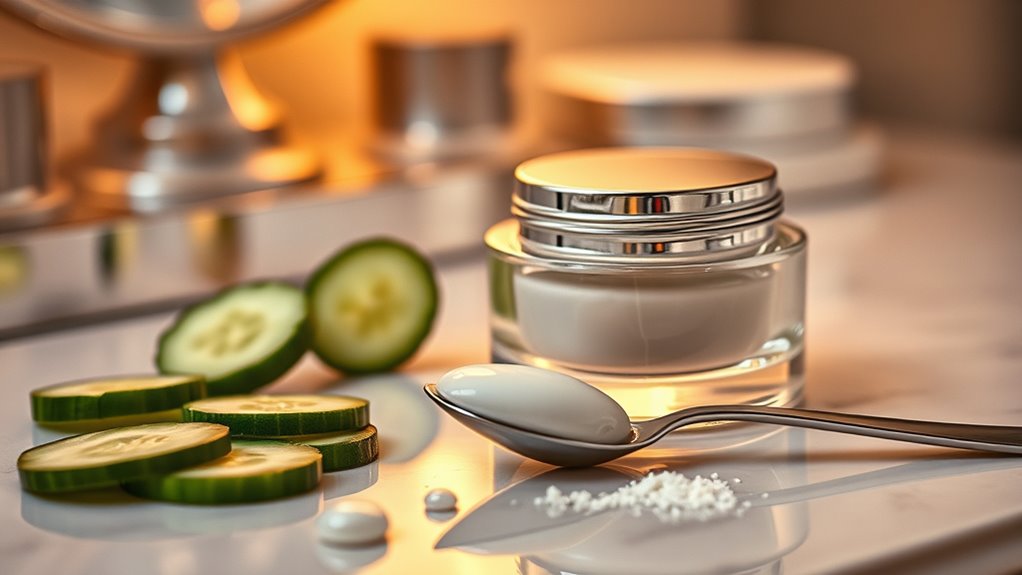
Choosing effective eye creams doesn’t have to mean opting for luxury brands; instead, focus on ingredients backed by science. Look for targeted ingredients like retinol, which boosts collagen and reduces fine lines, and vitamin C or niacinamide, which brighten and even out skin tone. Hydrating ingredients such as hyaluronic acid and ceramides improve plumpness and strengthen the skin barrier, while peptides support collagen production. Caffeine is excellent for reducing puffiness and dark circles by constricting blood vessels and enhancing circulation. Brightening agents help diminish discoloration, and soothing botanical extracts like chamomile or green tea calm irritation and inflammation. When selecting an eye product, prioritize these active ingredients to address your specific concerns effectively and efficiently. Additionally, incorporating skincare ingredient efficacy can help you identify products that deliver optimal brightness and clarity, making your skincare routine more effective. Understanding data privacy challenges can guide you toward choices that truly work for your skin.
Do You Really Need a Special Product for the Delicate Eye Area?
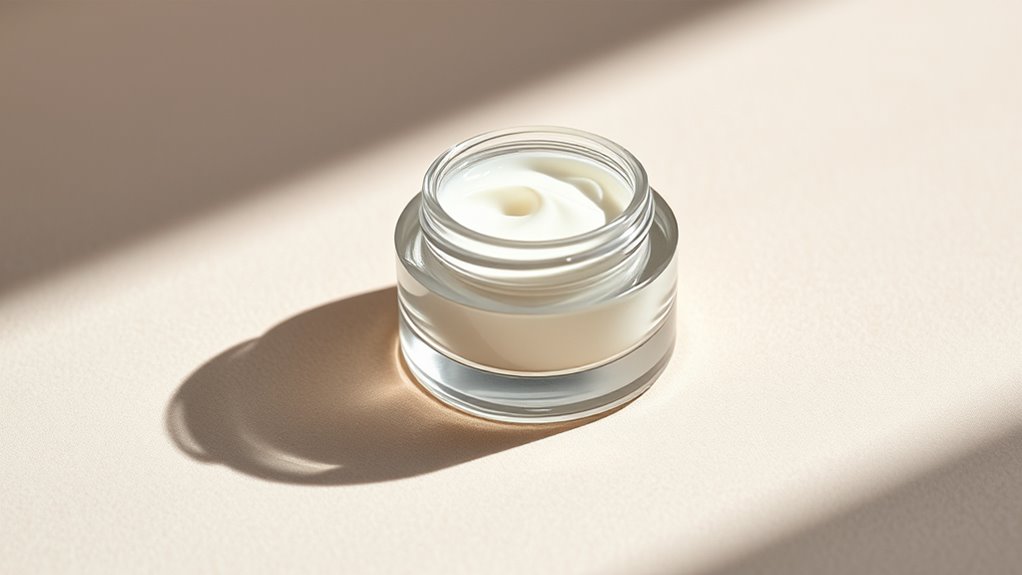
The delicate skin around your eyes often leads people to believe they need a separate product, but that’s not always necessary. Eye creams are formulated to be gentle and lightweight, yet many contain ingredients found in regular moisturizers. The skin around eyes is about 0.5mm thick, making it more prone to irritation, puffiness, and fine lines. To combat these issues, targeted ingredients like caffeine and peptides are often included in eye skincare. Additionally, a good facial moisturizer with the right ingredients can be just as effective if it’s gentle enough. Furthermore, selecting products with appropriate formulation for absorption can make a significant difference in effectiveness. Using products designed specifically for the sensitive eye area can reduce the risk of irritation and improve results. The main benefit of a dedicated eye product is its formulation for absorption and minimal irritation. Whether you choose a specialized eye cream or a gentle moisturizer depends on your skin’s needs and sensitivities. Additionally, understanding the importance of maximizing space and organization in your skincare routine can help ensure that your products are stored properly and remain effective over time. Incorporating product organization can also streamline your routine, making it easier to apply the right products to the right areas. Recognizing individual skin sensitivities can help tailor your choices for better results.
How to Choose and Use Eye Creams for Best Results

To get the best results from your eye cream, start by identifying your main concerns, whether it’s dark circles, puffiness, or fine lines. Choose eye creams with targeted ingredients like vitamin C, caffeine, or retinol that address these issues. Check the ingredient list for proven actives such as hyaluronic acid for hydration, peptides for firmness, or antioxidants for protection, ensuring they match your skin’s needs. Apply a small, pea-sized amount gently around the orbital bone using your ring finger, avoiding direct contact with the eyelid or lashes. Use your eye cream consistently in both morning and evening routines. Consider your skin type and sensitivities—fragrance-free, soothing formulas work well for sensitive skin, while brightening ingredients help with discoloration. Additionally, proper tuning of your skincare routine can enhance the effectiveness of your eye cream. Regularly maintaining your overall skincare regimen can help improve results and prevent further issues. Incorporating beyond basic skincare practices, such as protecting your skin from sun damage, can also support your eye area’s health and appearance. Staying mindful of product expiration dates ensures you are using fresh and effective formulations for optimal results. For optimal results, be mindful of your support hours and plan your routine when your skin is most receptive.
Frequently Asked Questions
Is It Worth Buying Expensive Eye Cream?
You’re wondering if splurging on expensive eye cream is worth it. While luxury options often have higher concentrations of active ingredients and better textures, they don’t always deliver better results than affordable alternatives. If you focus on key ingredients like retinol or peptides, you can achieve similar benefits without the high price tag. Ultimately, consistency and quality ingredients matter more than branding or packaging.
Is Eye Cream Really Different From Face Cream?
You might wonder if eye cream is really different from face cream. The skin around your eyes is thinner and more delicate, making it more prone to aging signs and damage. While both products can contain similar ingredients like retinol or vitamin C, eye creams are formulated specifically to be gentler and more effective for this sensitive area. So, using a dedicated eye cream can offer better protection and targeted benefits.
How Do I Choose the Best Under Eye Cream?
When selecting the optimal under-eye cream, concentrate on your particular worries such as puffiness or dark circles. Search for active components like caffeine, vitamin C, or hyaluronic acid that address these concerns. Opt for a formula appropriate for your skin type—sensitive, dry, or oily—and examine its texture to guarantee it absorbs well without irritation. Ultimately, opt for a product within your budget that’s dermatologist-approved for effective results.
Can You Use Any Cream as Eye Cream?
Did you know that 60% of people use the same moisturizer for their face and eyes? You shouldn’t. Regular creams often contain ingredients that can irritate delicate eye skin or aren’t effective against puffiness and dark circles. Instead, opt for products formulated specifically for the eye area. These are lighter, milder, and target eye concerns more effectively, helping you avoid irritation and get better results.
Conclusion
While a basic moisturizer can often suffice, investing in a specialized eye cream offers targeted benefits, much like choosing fine silk over cotton. The luxury isn’t just about price—it’s about addressing the delicate skin around your eyes with precision. Ultimately, whether you opt for a simple formula or a luxe treatment, what matters most is understanding your skin’s needs. After all, true luxury lies in the care you give, not just the product you choose.
